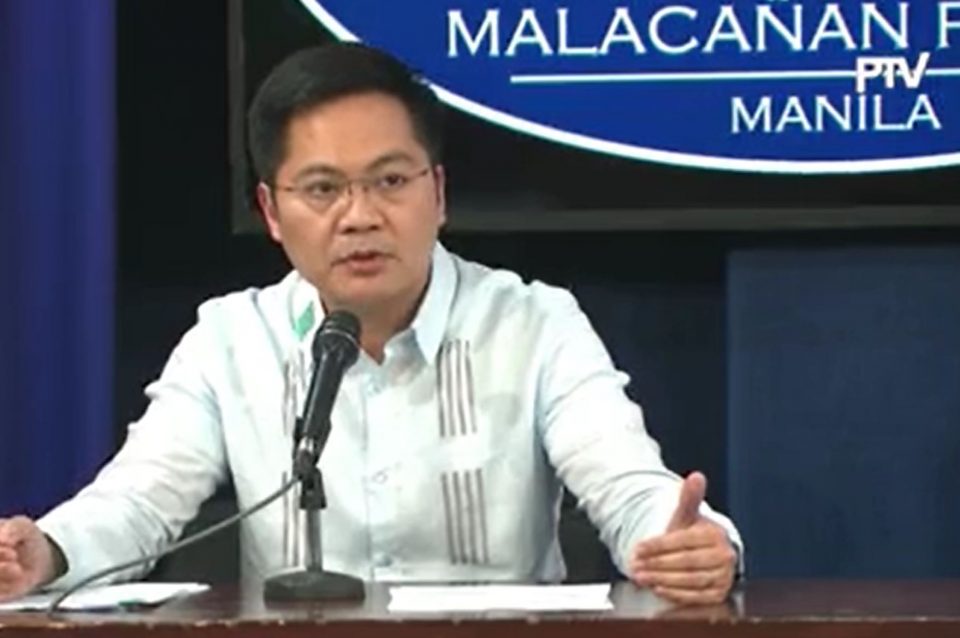
(Eagle News) – Malacanang released guidelines on the strict implementation of the “enhanced community quarantine” for the whole island of Luzon including strict home quarantine, prohibition of mass gatherings and suspension of mass public transport.
The enforced community quarantine will be implemented starting 12 a.m., Tuesday, March 17, until 12 a.m. of April 13, 2020 amid rising coronavirus cases which as of Monday were at least 140.
Cabinet secretary Karlo Nograles said that the situation is likened to a state of calamity.
-Mass gatherings banned, provisions for food to be regulated-
“Mass gatherings shall be prohibited,” he said reading the memorandum on the guidelines issued by Executive Secretary Salvador Medialdea.
“A strict home quarantine shall be observed in all households. Movement shall be limited to accessing basic necessities,” Nograles said.
“Provision for food and essential health services shall be regulated, and there will be heightened presence of uniformed personnel to enforce quarantine procedures,” he said.
The guidelines said that only a work from home arrangement shall be implemented in the Executive branch, except for the Philippine National Police, Armed Forces of the Philippines, Philippine Coast Guard, and health and emergency frontline services, border control and other critical services which “shall ensure a skeletal work force.”
-Establishments providing food, basic necessities allowed to open-
“Only those private establishments providing basic necessities and such activities related to food and medicine production, i.e., public markets, supermarkets, groceries, convenience stores, hospitals, medical clinics, pharmacies and drug stores, food preparation and delivery services, water-refilling stations, manufacturing and processing plants of basic food products and medicines, banks, money transfer services, power, energy, water and telecommunications supplies and facilities, shall be open,” the memorandum stated.
But it strictly advised the management of such open establishments to “ensure the adoption of a strict skeletal workforce to support operations, as well as all strict social distancing measures.”
It said Business Process Outsourcing establishments and export-oriented industries shall remain operational. But this is on condition that strict social distancing measures are observed.
Their respective personnel should also be provided with appropriate temporary accommodation arrangements by March 18. A skeletal work force shall also be implemented, the memorandum said.
-Media personnel should secure ID from PCOO-
It said that media personnel will also be allowed to travel within the quarantine area, “provided that within 72 hours from the issuance of this Memorandum, media personnel intending to travel within the quarantine area shall secure an identification card from the Presidential Communications Operations Office.”
The memorandum also allows “transit to and from” the establishments allowed to open within the area covered by the Enhanced Community Quarantine.
“Security personnel of the same establishments shall likewise be allowed to travel within the quarantine area,” it said.
“The movement of cargoes within, to and from the entire Luzon shall be unhampered. For this purpose, guidelines for the accompanying crew or personnel of transiting cargoes shall be formulated by the Department of Transportation,” the guidelines further said.
“Land, air and sea travel of uniformed personnel for official business, especially those transporting medical supplies, laboratory specimens related to the COVID-19, and other humanitarian assistance, shall be allowed,” it added.
-Violators warned-
The memorandum also warned those violating the guidelines with sanctions, including criminal and administrative charges.
“Failure to abide by the foregoing guidelines and measures shall be subjected to appropriate action, both criminal and administrative, in accordance with relevant laws and regulations,” it said.
“For this purpose, the Department of Justice is directed to initiate appropriate charges, as may be warranted,” it added.








